|
|
|
Sort Order |
|
|
|
Items / Page
|
|
|
|
|
|
|
| Srl | Item |
| 1 |
ID:
080575


|
|
|
|
|
| Publication |
2007.
|
| Summary/Abstract |
This article proceeds through a case study of commemorative rhetoric in a British settler state, Australia, and in a provincial capital, Brisbane, whose dominant commemorative group, the Anzac Day Commemoration Committee (ADCC), had claims to have invented the national memorial rituals for the principal day of remembrance. It briefly surveys the broader Australian commemorative background, then explores the control of Anzac Day in Brisbane, focusing on accommodations and alliances between political, civil and religious leaders and the principal returned soldiers' organization, the Returned Sailors' and Soldiers' Imperial League of Australia (RSSILA) on the ADCC, in Anzac Day activities, and in Anzac Day rhetoric. The article suggests that the theme of 'triumphalism' has been underplayed in analysis of interwar commemorative rhetoric in Australia, and that cooperation, accommodation and alliance were more typical of interwar commemoration than contest
|
|
|
|
|
|
|
|
|
|
|
|
|
|
|
|
| 2 |
ID:
080578
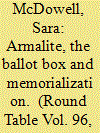

|
|
|
|
|
| Publication |
2007.
|
| Summary/Abstract |
Commemoration of the Northern Ireland Troubles has gained increasing currency since the inception of the first paramilitary ceasefires in 1994. Imagined initially as a mechanism through which to express grief and acknowledge loss, remembering the past has an increasingly social and political value. Inscribing narratives of the past into the streetscape is inexorably linked to the present as some of the main actors of the conflict vie for power and territory. A political resource, memorializtion has been employed as a tool to alter the parameters of the Troubles. This paper focuses on the changing fortunes of Sinn Féin (the political wing of the paramilitary organiztion the Irish Republican Army), and the British government in peacetime Northern Ireland, through an examination of the commemoration of their respective dead
|
|
|
|
|
|
|
|
|
|
|
|
|
|
|
|
| 3 |
ID:
184089
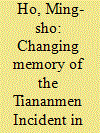

|
|
|
|
|
| Summary/Abstract |
This article examines the three-decade evolution of remembering the Tiananmen Incident in Taiwan by looking at annual commemorative activities. There is a decisive shift from a patriotic understanding to a cosmopolitan perspective grounded in universal values. The earlier memory was based on an ethnic nationalism that stressed consanguinity among Taiwanese and mainland Chinese and a narrative of the Chinese Republican Revolution. However, such framing lost its persuasiveness and the memory of Tiananmen faded as Taiwanese, particularly the younger generation, embraced an indigenous identity. China’s rapid economic growth and its ascendency as a new world power neutralized the potency of the earlier memory because it demonstrated the possibility of nationalistic aspirations without democracy. Since 2011, commemorative rallies have revived and proceeded with a newer understanding of the Tiananmen Incident in terms of human rights, civil society, and youth activism. This article argues that this ‘mnemonic change’ reflects Taiwan’s democratization and the indigenization of Taiwanese society, enabling young organizers to articulate their own Tiananmen memory by referencing global civil-society activism. Mnemonic change in Taiwan is examined with a comparative reference to the parallel development in Hong Kong.
|
|
|
|
|
|
|
|
|
|
|
|
|
|
|
|
| 4 |
ID:
146416


|
|
|
| 5 |
ID:
191116


|
|
|
|
|
| Summary/Abstract |
This article addresses the Taipei National Revolutionary Martyrs’ Shrine (Guomin geming zhonglie ci) as a site of contention over national sovereignty and belonging. The shrine originated in Sun Yat-sen's aspiration to commemorate the anti-imperial martyrs of the 1911 Republic and in the Nationalist government's attempt to marshal political allegiance in the 1920s–1940s. Upon fleeing from the mainland to Taiwan after losing to the Communist forces in 1949, the Nationalist leadership renovated the Japanese-built National Protection Shrine in Taipei, transforming it into the National Revolutionary Martyrs’ Shrine to house the displaced spirits of the national dead. Throughout the Cold War era, the spring and autumn sacrifices performed by heads of state and visits to the shrine by foreign dignities served to affirm the sovereignty of the Republic of China vis-à-vis the People's Republic of China. Even though the end of martial law in 1987 opened a new era marked by the Nationalist Party's loss of political hegemony, the shrine continued to adhere to the Nationalist Party's ideology and version of history. Far from embodying a place of remembrance and mourning for war victims, the palace-style compound is a site of contested sovereignty exaggerated by China's extraordinary growth and Taiwan's transforming identity. The enshrined dead have found a new role as both an assertion of the island's autonomy and a reflection of its dynamism. The departed, albeit silent, hold power in the malleability of their memories, and each permutation of how the past is remembered hosts its own tension.
|
|
|
|
|
|
|
|
|
|
|
|
|
|
|
|
| 6 |
ID:
161644
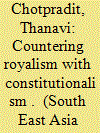

|
|
|
|
|
| Summary/Abstract |
The Boworadet Rebellion in October 1933 brought brutality into the heart of Thailand’s politics. It was followed by a proliferation of commemorative practices focusing on the commoners who sacrificed their lives for the country. In the aftermath of the incident, the search for an appropriate language of loss involved the making of a new meaning of national sacrifice and what it was to be a good citizen. This article considers the nationalisation of death, as manifested in the commemorative visual forms of the crematorium for the 17 soldiers and police officers at Sanam Luang and the Safeguarding the Constitution Monument in Lak Si District. It concentrates on the appropriation of royal inheritance by the People’s Party and the transformation of phan ratthathammanun (a Book of the Constitution on an ornate double tray), which first appears in an anti-royalist context after the revolutionaries suppressed the Boworadet Rebellion. The presence of phan ratthathammanun in this context marks the separation of constitutionalism from royalism and establishes it as a stand-alone symbol of a supreme ideology worth dying for. This article analyses the visual culture of the period following the Boworadet Rebellion in relation to the formation of the Boworadet Rebellion war memory, the new ideology of constitutionalism and the new identity of the Thai people as citizens of the nation instead of subjects of the King.
|
|
|
|
|
|
|
|
|
|
|
|
|
|
|
|
| 7 |
ID:
139130


|
|
|
|
|
| Summary/Abstract |
The Great Iraqi Revolution of 1920 was actually a series of local, mostly Shi‘ite, uprisings against the British forces which had occupied Iraq during the First World War. Even though it was squashed by the British, it has been established since then in the Iraqi collective memory as a war of independence and a formative event of Iraqi nationalism, symbolizing the unity of the Iraqi people, their solidarity and patriotic spirit. This article tries to show how the Great Iraqi Revolution was commemorated and remembered through time in order to provide better understanding about how Iraqis see themselves and their past.
|
|
|
|
|
|
|
|
|
|
|
|
|
|
|
|
| 8 |
ID:
120369


|
|
|
|
|
| Publication |
2013.
|
| Summary/Abstract |
This article explores competing histories of independence in Côte d'Ivoire. The 2010 commemoration of fifty years of independence led to competing histories about how and if the nation achieved independence in 1960. The postelectoral crisis of 2010-2011 that followed soon afterwards has been interpreted by supporters of the outgoing president Laurent Gbagbo as an attempt by France and the international community to re-colonise Côte d'Ivoire. The article asks how different versions of this history are connected to different political projects and how they have changed through time. The article will analyse these processes of meaning-making in a historiology of Ivorian independence, thus contributing to constructivist accounts of nationhood, collective memory and historiography. The paper thus argues that different media of recalling the past in the present, such as commemoration and historiography, should be studied in a complementary manner to understand how (joint) remembering and forgetting are tools and mirrors of nations at work.
|
|
|
|
|
|
|
|
|
|
|
|
|
|
|
|
| 9 |
ID:
144584


|
|
|
|
|
| Summary/Abstract |
The ancient Greek city of Aphrodisias in Asia Minor presents abundant source material–inscriptions and images–for the study of memory and identity from the late second century bce to the seventh century ce. These sources permit the study of overlapping civic, social, and religious identities, the expression of changing identities through name changes, the significance of memories of war and foundation legends for the transmission of collective and cultural memory, the agency of elite benefactors and intellectuals, the role played by inscriptions in the construction and transmission of memory, and the adaptation of identity to changing contexts, including emerging contacts with Rome, competition with other cities, an elevated position as provincial capital, and the spread of Christianity. In late antiquity–when the importance of religious conflicts increased–personal names, religious symbols, and acclamations became an important medium for the expression of the identity of competing religious groups.
|
|
|
|
|
|
|
|
|
|
|
|
|
|
|
|
| 10 |
ID:
101042


|
|
|
|
|
| Publication |
2010.
|
| Summary/Abstract |
At the height of the United States wars in Southeast Asia in the 1970s, while political violence wrecked the provinces, Bangkok became one of the most visible sites of violence in Thailand against leftist social movements. Drawing from an ethnography of commemoration and the military archive, I suggest that after thirty years of silence, current commemorations speak to how emotional engagements are maneuvered in the public arena into a politics of forgetting. At the same time, relatives of those killed by state violence and activists enact mourning practices to insist on loss and to challenge the state-sponsored celebrations of fallen heroes. Ultimately, Thai pasts are worked through these commemorations as "spectacular-time." As spectacle, the commemorations reenact the marches of the student movement as part of national history, to witness recreated scenes of violence, to relive particular landmarks as infused with meaning, and to identify with the alterity of 1970s leftist radicalism or the centrality of state manufactured democracy in Thailand.
|
|
|
|
|
|
|
|
|
|
|
|
|
|
|
|
| 11 |
ID:
191070
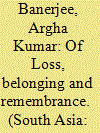

|
|
|
|
|
| Summary/Abstract |
This article undertakes a critical exploration of the Indian poetic responses to World War I. The most striking feature of this poetry was its uniquely diverse nature, which reflected in full the multicultural character of the Indian army at the Western Front and elsewhere in the world. The immense diversity of Indian soldiers triggered a wide range of emotions and ideas from combatants and civilians alike. While we have established writers like Rabindranath Tagore and Sarojini Naidu on the one hand, we have a poetic miscellany of lesser known creative voices on the other, some even documenting their first-hand experiences of the War. Poems, lyrical propaganda, folk-songs, epistolary verse, elegies and even verses accompanying posters make up the various modes of literary circulation during this time of unprecedented global turmoil. Making use of both original compositions and various other works in translation, this article argues that most of this poetic evidence often serves as crucial testimonies, chronicling not only the major historical events of the War years, but also assiduously recording the wide gamut of feelings and emotions associated with the conflict.
|
|
|
|
|
|
|
|
|
|
|
|
|
|
|
|
| 12 |
ID:
188165


|
|
|
|
|
| Summary/Abstract |
In Egyptian popular history and culture, Qasim Amin is often referred to the “father of feminism” or the “liberator of women.” However, this was not always the case. Upon his death in 1908, a different legacy emerged in many early eulogies, speeches, biographical sketches, and commemorations of Amin's life. In this early framing of Amin's legacy, his two most famous books were celebrated in ways that minimized the “woman question” while highlighting other aspects of his reforms and work. This allowed Amin's 1908 contemporaries to overlook the divisiveness of his earlier positions in favor of a new sort of fraternal solidarity—one that served the interests of certain political and intellectual male elites. For many of these writers—with a few notable exceptions—Amin was a quintessential reformer and thinker whose interest in the status of women was important insofar as it spoke to the ethos of his intellectual and political projects, not what it could do for women.
|
|
|
|
|
|
|
|
|
|
|
|
|
|
|
|
| 13 |
ID:
080577


|
|
|
|
|
| Publication |
2007.
|
| Summary/Abstract |
Memories of military sacrifices and demonstrations of 'national' characteristics of bravery, comradeship and integrity still have considerable popular purchase within contemporary states and communities, and as such can accrue significant political capital. With this in mind, this paper will show how Ulster Loyalists attempt to anchor themselves in the memory of the Somme, seeking to deliberately construct a line of direct continuity between modern Loyalism, which has been suffering from a variety of pressures, fissures and marginalization throughout the Northern Ireland peace process, and Ulster Unionism of the early 20th century, a period which in contrast was marked by unity, mass mobilization and elite leadership. Crucially, that political generation's decimation during the First World War is a potent myth of blood sacrifice which thickens, rather than pollutes, the narrative of a Unionist 'Golden Age' of mobilization and strength. As such, the mythic proving grounds of battlefields long gone have become advantageous sites for modern political acquisition. This use of the memory of the Great War as an identity resource will be compared and contrasted with similar projects in Canada and Australia.
Rather than simply miring Loyalists in archaic and militaristic tropes, and invented links to the past, this paper will argue that commemorations, particularly that of the Somme, can have a transformative and cohering effect on modern Loyalism, in both the political and paramilitary spheres.
|
|
|
|
|
|
|
|
|
|
|
|
|
|
|
|
| 14 |
ID:
161158
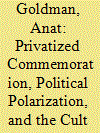

|
|
|
|
|
| Summary/Abstract |
This article explores the current ambiguous position of the cult of Atatürk in Turkish society and politics, as both a state cult that is not entirely desired by the ruling party and a fragmented and contested people’s cult. The article argues that the commodification and personal appropriation of the cult of Atatürk in the 1990s and 2000s blurred the lines between state and society and between political ideologies, eventually turning the cult into a much more inclusive realm than before, which enables debating national identity in Turkey despite the contentious political environment.
|
|
|
|
|
|
|
|
|
|
|
|
|
|
|
|
| 15 |
ID:
177966
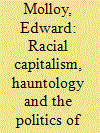

|
|
|
|
|
| Summary/Abstract |
This article explores the ways in which death can be understood to occupy a formative function in the construction of Irish national identity. The analysis of three distinct moments in Irish history (Plantation-era funerary practices, the Great Famine, and the 1981 hunger strikes) is undertaken with recourse to Michel Foucault’s understanding of race as it is deployed through disciplinary and biopower and Achille Mbembe’s concept of necropolitics. The continuing concern with history in Irish political discourse is juxtaposed with Derrida’s idea of ‘hauntology’. It will be seen that the act of remembering politically carries with it an ambivalent legacy, exposing the violence at the heart of the establishment of both states in Ireland, while maintaining the potential of emancipatory promise. This promise is itself rooted in the violence implicated in the production of alterity through the historical experience of death.
|
|
|
|
|
|
|
|
|
|
|
|
|
|
|
|
| 16 |
ID:
122909
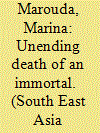

|
|
|
|
|
| Publication |
2013.
|
| Summary/Abstract |
Focusing on contemporary Viêt Nam, this article examines the monumentalizing project concerning the life, revolutionary career and political legacy of Hô Chí Minh. After Hô's death and especially after the introduction of doi moi, or renovation policies, the revolutionary state instigated a process of making memorials out of the places where he lived and struggled for the nation, projecting his biography onto the country's landscape. The article explores a series of ambiguities and uncertainties that, in a Derridian manner, haunt the state commemoration of Hô Chí Minh, and that are primarily manifested in his incomplete kinship status and imperfect death.
|
|
|
|
|
|
|
|
|
|
|
|
|
|
|
|
| 17 |
ID:
095135


|
|
|
|
|
| Publication |
2010.
|
| Summary/Abstract |
This article analyses why some countries in South East Asia have set aside a national day to remember the Japanese Occupation in the cause of nation-building and why other countries have tended to choose not to remember the Japanese Occupation because for them it does not further nation-building. Singapore, the Philippines and Burma have all remembered their experience of struggle and sacrifice during the Second World War to further national unity. However, most South East Asian countries have chosen at a national level not to commemorate this undoubtedly major watershed in the region's history.
|
|
|
|
|
|
|
|
|
|
|
|
|
|
|
|
|
|
|
|
|